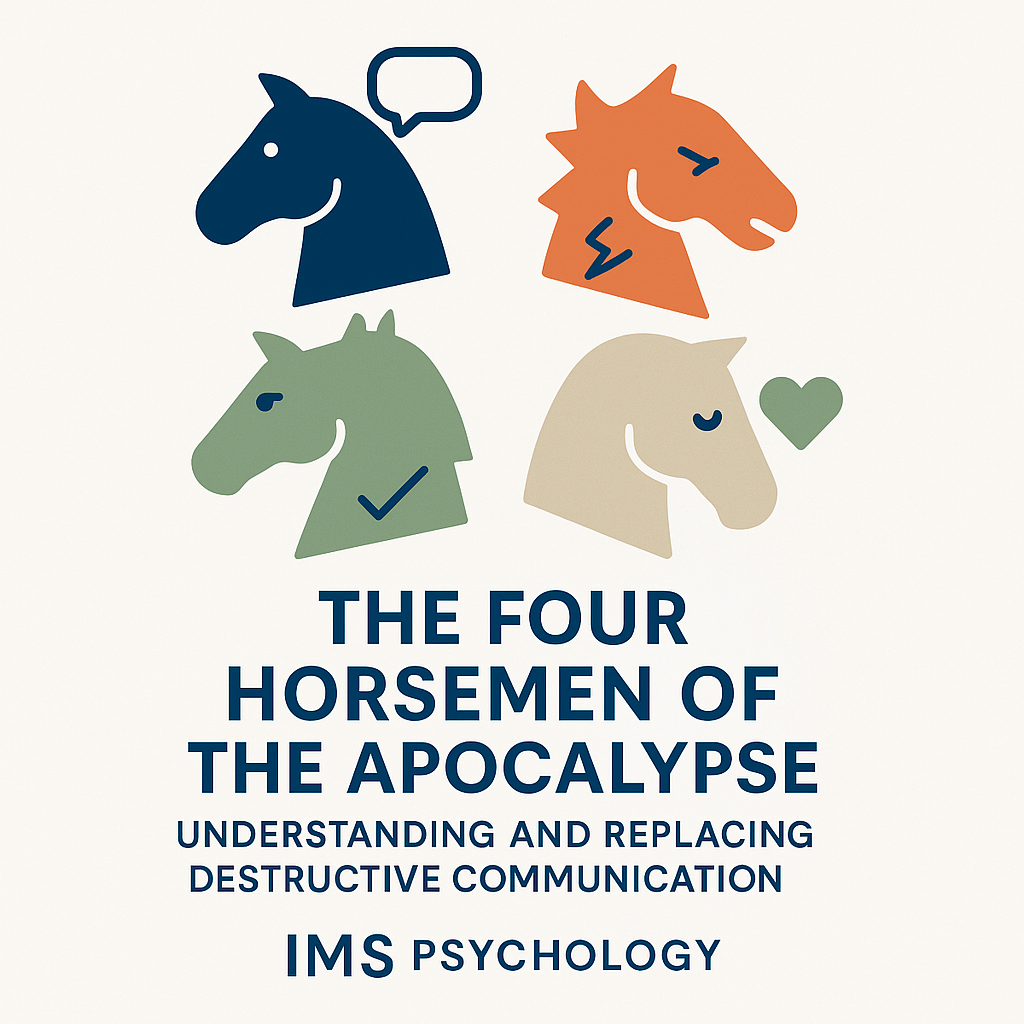
The Four Horsemen of the Apocalypse (Gottman Method): Understanding and Replacing Destructive Communication
Share
The Four Horsemen of the Apocalypse (Gottman Method): Understanding and Replacing Destructive Communication
Discover the Four Horsemen of the Apocalypse in relationships, based on the Gottman Method. Learn how to recognize and replace these destructive patterns with healthier communication.
Introduction: When Love Turns Into Conflict
Every relationship experiences disagreements. But according to relationship researcher Dr. John Gottman, how couples argue often predicts whether they will thrive or struggle. His research identified four destructive communication patterns — metaphorically named “The Four Horsemen of the Apocalypse” — that signal relationship breakdown if left unchecked.
The good news? Each horseman has an antidote. By understanding these patterns, couples can shift from disconnection to connection and rebuild trust.
The Four Horsemen of the Apocalypse: Gottman’s Framework
1. Criticism
-
What it looks like: Attacking a partner’s character instead of focusing on specific behavior.
-
Example: “You never listen to me. You’re so selfish.”
-
-
Why it’s harmful: Criticism makes the other partner feel attacked and often leads to defensiveness. Over time, it erodes emotional safety.
The Antidote: Gentle Start-Up
-
Use “I” statements: “I feel unheard when I’m speaking. Could we slow down and try again?”
-
Focus on specific behaviors, not character flaws.
2. Defensiveness
-
What it looks like: Refusing to take responsibility, making excuses, or counter-attacking.
-
Example: “It’s not my fault we’re late. You always take too long to get ready.”
-
-
Why it’s harmful: Defensiveness blocks repair and escalates conflict. It tells your partner their concerns don’t matter.
The Antidote: Take Responsibility
-
Even if only partially true, acknowledge your role: “You’re right, I could’ve managed my time better.”
-
Validation helps de-escalate tension.
3. Contempt
-
What it looks like: Mockery, sarcasm, name-calling, eye-rolling, or hostile humor.
-
Example: “Oh please, like you ever know what you’re talking about.”
-
-
Why it’s harmful: Gottman’s research shows contempt is the strongest predictor of divorce. It conveys superiority and deep disrespect.
The Antidote: Build a Culture of Appreciation
-
Regularly express gratitude: “I appreciate how hard you work for our family.”
-
Replace criticism with curiosity and respect.
4. Stonewalling
-
What it looks like: Shutting down, withdrawing, or refusing to engage during conflict.
-
Example: Walking away mid-conversation without explanation.
-
-
Why it’s harmful: Stonewalling leaves issues unresolved and creates emotional distance. It often happens when one partner feels overwhelmed.
The Antidote: Self-Soothing & Re-engagement
-
Take a break when flooded (at least 20 minutes).
-
Return to the conversation once calmer, signaling willingness to engage: “I want to talk about this, but I need a short pause first.”
Why the Four Horsemen Show Up
These patterns are common under stress, but chronic use often indicates deeper relational struggles such as:
-
Poor conflict resolution skills
-
Emotional disconnection
-
Unresolved resentment
-
High levels of stress or trauma history
Understanding the horsemen provides couples with awareness — the first step toward repair.
The Antidotes in Practice
Replacing destructive patterns takes practice. Some strategies include:
-
Daily Appreciation Rituals: Share one thing you value about your partner each day.
-
Repair Attempts: Use humor, gentle touch, or kind words to de-escalate conflict.
-
Conflict Agreements: Set rules like “no yelling” or “we take breaks when overwhelmed.”
-
Therapeutic Support: Gottman Method couples therapy teaches structured tools for communication repair.
A Trauma-Informed Lens
For couples where trauma is present, the Four Horsemen may surface more easily because the nervous system is hyper-sensitive to threat. In these cases:
-
Self-regulation practices (breathwork, grounding) can help reduce escalation.
-
Compassionate curiosity (instead of judgment) helps partners understand reactions.
-
Professional therapy may be essential for long-term relational healing.
When to Seek Support
If criticism, contempt, defensiveness, or stonewalling dominate your relationship, outside support can be transformative. Gottman-trained therapists or relationship coaches can guide couples toward healthier communication.
Practical Tools for Couples
IMS Psychology provides downloadable, evidence-based workbooks designed to strengthen communication and connection. Our [Couples Communication Toolkit] offers step-by-step exercises to replace destructive patterns with healthy dialogue.
Conclusion: From Conflict to Connection
Conflict is not the end of a relationship — but destructive communication can be. The Four Horsemen of the Apocalypse highlight the patterns most harmful to love, but with awareness and practice, they can be replaced by empathy, responsibility, and appreciation.
By learning these skills, couples can move from disconnection to trust, safety, and intimacy.
If you’d like guided exercises to strengthen your relationship, explore the IMS Psychology workbooks, created with care to turn research into practice.
written by,
Martin Rekowski (30.09.2025)
External Source
Gottman Institute – The Four Horsemen: Criticism, Contempt, Defensiveness, and Stonewalling
https://www.gottman.com/blog/the-four-horsemen-recognizing-criticism-contempt-defensiveness-and-stonewalling/